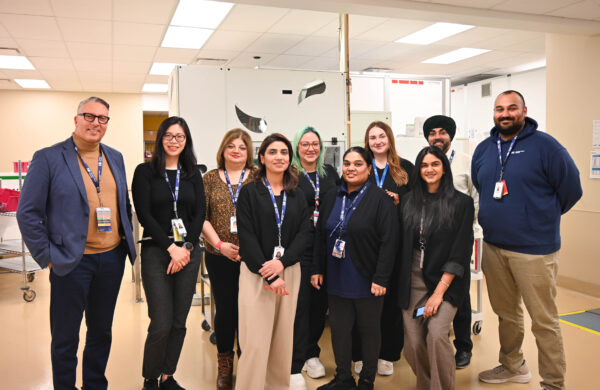Appreciating Pharmacy Services
26
Mar
2024
The Pharmacy Department at Humber River Health (Humber) consistently provides safe, effective, and quality-based medication use in innovative ways throughout the Hospital. Their team is comprised of a dedicated group of professionals who have pivotal roles in patient-centred care. This encompasses knowledge and expertise that has allowed for an array of activities and initiatives to flourish, all aimed at enhancing patient care and improving overall operational efficiency.
Below are examples of such initiatives:
Procurement
The Pharmacy Inventory Team at Humber procures medications from various companies and vendors to ensure patient-centred care. Despite many hurdles or challenges such as drug shortages and recalls, a top priority for the Pharmacy Inventory Team is to optimize medication inventories to ensure medications are readily available for patients.

Infusion Pump Drug Library Guardrails
Clinical Pharmacist Staff Members of Pharmacy Services are involved with the programming and optimization of smart infusion pump drug libraries, which includes adjusting medication infusion guardrails, auditing, and promoting best practices in infusion pump usage. This involves:
- Specialized pharmacists in critical care, emergency medicine, pediatrics, oncology, and general medicine, extracting and analyzing infusion pump data for trends and emerging patterns, while monitoring and reviewing trends in soft limit overrides and hard limit attempts in collaboration with nursing leaders
- Presenting Drug Library recommendations, additions, and revisions to the Safe Medication Practice Committee (SMP) for discussion and endorsement
- Reviewing all patient safety incidents involving infusion pumps in complete detail
Recently, a hospital-specific pharmacy-training manual has been developed to assist pharmacists who become involved in managing the infusion pump Drug Library. Infusion pump-trained pharmacists have also begun collaborating with external hospital stakeholders to problem solve, discuss best practices, and share solutions.

Sustainability
Humber’s Pharmacy Sustainability Team includes the drug use evaluation pharmacist, specialized inventory technicians, general medicine and critical care pharmacists and pharmacy management. The team promotes environmental sustainability initiatives, including:
- Optimizing inventory practices such as minimizing the number of avoidable orders and transport deliveries
- Reducing unnecessary duplicate dispensing
- Reducing use of high environmental impact medications such as desflurane
The drug use evaluation pharmacist supports the optimization of Humber’s drug formulary and recommendations to promote evidence-based and environmentally friendly prescribing practices, such as:
- Optimizing drug formats, like smaller packaging sizes to reduce medication wastage
- Encouraging use of dry powder inhaler therapy over metered dose inhalers to reduce potent greenhouse gas emissions.
Overall, Humber’s Pharmacy Sustainability Team welcomes environmentally sustainable opportunities.

IV Workflow
Pharmacy Services has a Centralized Intravenous Admixture Program (CIVA), which prepares many intravenous (IV) medications in a ‘Ready to Use” format for administration. The Sterile Compounding Team consists of pharmacy technicians who prepare a variety of products for our patients. The use of automation includes the barcode scanning of individual ingredients to ensure the correct medications every time. These items include electrolytes, antibiotics, total parenteral nutrition (TPN), pain medications, chemotherapy and many other IV products.
All products prepared meet or exceed the National Association of Pharmacy Regulatory Authorities (NAPRA) compounding standards.

Alert Fatigue
Humber’s Pharmacy Services Team includes pharmacists, who are responsible for clinical informatics and the development, implementation, and coordination of the electronic medication-related order entry system and other information systems to enhance knowledge and communication.
Along with the clinical pharmacists and information services colleagues, the team has implemented various initiatives to reduce alert fatigue. Below are a few examples of how clinical informatics leverages technology to optimize patient safety and deliver innovative patient care daily:
- Reductions and/or elimination of Meditech medication order entry and administration alerts that are not actionable or have limited clinical significance
- Development of administration-specific alerts upon MAR documentation
- Assessment and adjustment of clinical severity levels for drug interactions alerts

Antimicrobial Stewardship
Humber’s Antimicrobial Stewardship Program (ASP) promotes appropriate antimicrobial use at a patient care and organizational level. The program consists of a multidisciplinary team who make coordinated efforts to ensure patient safety.
ASP pharmacists focus on antimicrobial medication therapy by promoting optimal antimicrobial selection, dosage, duration of therapy, and route of administration. Some of their work includes:
- Daily review of patient charts with infectious disease physicians to provide real-time feedback to the medical team
- Supporting clinicians with antimicrobial decisions through various tools, such as up-to-date guidelines, policies, antibiograms, presentations, and other information
- Conducting regular surveillance of antimicrobial use to ensure ASP goals are being met
Antimicrobial medication therapeutic management is only one component of antimicrobial stewardship. The team also works alongside other colleagues with diverse expertise and a shared goal of delivering the highest quality care for patients. According to the ASP pharmacists, empowering others to be stewards in their own practice is one of the most rewarding elements of their work.

The Pharmacy Services Team at Humber plays a pivotal role in allowing the Hospital to achieve its mission of delivering safe, innovative, and equitable healthcare in the community.

